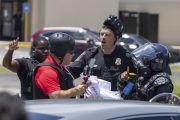
In an opinion piece that stretches the boundaries of logic and reason even for a newspaper as liberal as the New York Times, Mariame Kaba attempts to blow away the cobwebs and clarify what liberal groups such as BLM and Antifa mean when they say “Abolish the Police.” The answer is in the title of her article: “Yes, We Mean Literally Abolish the Police — Because Reform Won’t Happen.”
Mariame Kaba is descibed in her byline as “an organizer against criminalization.” But that is about as nebulous as anything can be. Just what “criminalization” is Kaba against? The reason there is no clarification is because none is necessary — or accurate. She is against all criminalization. You read that correctly: Her premise appears to be that nothing should be criminalized. But what about something as universally condemned as rape? She covers that in the article (read on for details).
Before getting into the content of her infantile discourse in abandoning law and order, perhaps it would help to look at her credentials and what likely led to the Times running her opinion piece. First, the “newspaper of record” — in an odd move — listed the following disclaimer at the conclusion of Kaba’s juvenile rant:
Mariame Kaba (@prisonculture) is the director of Project NIA, a grass-roots group that works to end youth incarceration, and an anti-criminalization organizer.
The Times is committed to publishing a diversity of letters to the editor. We’d like to hear what you think about this or any of our articles. Here are some tips. And here’s our email: [email protected].
That seems to imply that this opinion piece is little more than a long “letter to the editor,” but just below that, is the following note:
A version of this article appears in print on June 14, 2020, Section SR, Page 2 of the New York edition with the headline: Yes, We Mean Literally Abolish the Police
So, rather than being a “letter to the editor,” it is an “article” that was published both in print and online. Clearly, it has something approaching an imprimatur from the Times. At the very least it is enough in keeping with their editorial position that the Gray Lady’s leadership deemed it worthy of mass circulation in all possible formats.
And when one clicks her name in the disclaimer, her website opens and presents the reader with a laundry list of pseudo-qualifications. Allow this writer to summarize that list. Kaba has been involved with a litany of anti-American, pro-Communist causes and has advocated for anything that would dismantle the United States in preparation for a new and improved Socialist States. But chief among her “qualifications” is one that is surprising in its admission. Soros-bots usually attempt to conceal their association with the anti-American Daddy Bigbucks. Not so Kaba. She proudly lists, “I was a 2016-2017 Soros Justice Fellow where I extended and expanded my work to end the criminalization of survivors of violence.” That point includes a link to the Soros-operated Open Society Foundations. Shock and awe, a woman who is making a name for herself demanding that police simply cease to exist was propped up and equipped by George Soros? Say it isn’t so.
So, with that background, what does Kaba have to say about “literally” abolishing the police?
She begins with a bold assertion which she then backs with — well, nothing, really (a trend she follows throughout the article). This writer does not mean that she literally does not back up her assertions, only that she backs them up with either other assertions or misrepresentations of the facts.
That first bold assertion is:
Enough. We can’t reform the police. The only way to diminish police violence is to reduce contact between the public and the police.
There is not a single era in United States history in which the police were not a force of violence against black people. Policing in the South emerged from the slave patrols in the 1700 and 1800s that caught and returned runaway slaves. In the North, the first municipal police departments in the mid-1800s helped quash labor strikes and riots against the rich. Everywhere, they have suppressed marginalized populations to protect the status quo.
That is a lot of manure to unpack.
To show that “The only way to diminish police violence is to reduce contact between the public and the police,” Kaba simply states another assertion: “There is not a single era in United States history in which the police were not a force of violence against black people.” To back up that assertion, she states that “Policing in the South emerged from the slave patrols in the 1700 and 1800s that caught and returned runaway slaves.” Let me get this straight — there were no police in the southern states (including Virginia, which dates back more than 400 years) before the 1700’s? And the first police in the south were slave patrols?
It took all of about one minute to search the web and prove that bogus. The Virginia Division of Capitol Police is America’s oldest police department, originating in 1618. Begun in Jamestown, the Capitol Police are now located in Richmond (since it is the capitol). It has general law-enforcement responsibility for the Capitol Complex and shares concurrent jurisdiction with the Richmond City Police Department.
It was formed to protect the governor from hostile native American Indians. By 1663, it was expanded to a force of 20 men and assigned to protect the governor, the Council, and the Colonial Assembly. It was not a “slave patrol.”
But next in her proof of her assertions, Kaba conflates her lists of “victims” — and in so doing, tips her communist mitt. Starting out writing of black people, she slips into class warfare, writing, “In the North, the first municipal police departments in the mid-1800s helped quash labor strikes and riots against the rich.”
Well, duh!? Should police not protect the life, liberty, and property of all, including the rich?
Having laid that tenuous foundation for her argument, she goes on to do what should be universally rejected in a world that rightly demands that each person be judged on the merits of their own character and actions; she pulls out the broadest brush she can find and paints all cops with it:
So when you see a police officer pressing his knee into a black man’s neck until he dies, that’s the logical result of policing in America. When a police officer brutalizes a black person, he is doing what he sees as his job.
With her premise having failed so miserably, it should come as no surprise that her conclusion is equally faulty. Of course, it is a simple matter for this writer to do what Kaba did not do and back up that assertion. If the “job” of police officers is to brutalize black people, then perhaps Kaba can explain the hundreds of thousands of cops (many of them black) who have died over the past decades protecting black people (often from other black people).
At any rate, Kaba then moves into a dizzying list of further assertions backed by (you guessed it) still more assertions and inverted facts, twisted beyond the point where they could even be recognized. Context? She provides none.
Next, she moves to the question to which no one has been able to give an adequate answer, “What would we do about crime, if there were no police? Not to worry: Kaba — like all before her and all who will come after — fails to give a good answer. Her answer is simple: Do away with crime. Make nothing criminal. Literally. Here is what she writes:
But don’t get me wrong. We are not abandoning our communities to violence. We don’t want to just close police departments. We want to make them obsolete.
We should redirect the billions that now go to police departments toward providing health care, housing, education and good jobs. If we did this, there would be less need for the police in the first place.
We can build other ways of responding to harms in our society. Trained “community care workers” could do mental-health checks if someone needs help. Towns could use restorative-justice models instead of throwing people in prison.
What about rape? The current approach hasn’t ended it. In fact most rapists never see the inside of a courtroom. Two-thirds of people who experience sexual violence never report it to anyone. Those who file police reports are often dissatisfied with the response. Additionally, police officers themselves commit sexual assault alarmingly often. A study in 2010 found that sexual misconduct was the second most frequently reported form of police misconduct. In 2015, The Buffalo News found that an officer was caught for sexual misconduct every five days.
If you, like this writer, imagine the likely outcome of a world where social services and free money replaces law and order as a world of crime and violence, Kaba predicted you, ending her article/letter to the editor with:
When people, especially white people, consider a world without the police, they envision a society as violent as our current one, merely without law enforcement — and they shudder. As a society, we have been so indoctrinated with the idea that we solve problems by policing and caging people that many cannot imagine anything other than prisons and the police as solutions to violence and harm.
People like me who want to abolish prisons and police, however, have a vision of a different society, built on cooperation instead of individualism, on mutual aid instead of self-preservation. What would the country look like if it had billions of extra dollars to spend on housing, food and education for all? This change in society wouldn’t happen immediately, but the protests show that many people are ready to embrace a different vision of safety and justice.
When the streets calm and people suggest once again that we hire more black police officers or create more civilian review boards, I hope that we remember all the times those efforts have failed.
There is that broad brush again (“especially white people”) accompanied by the most powerful rose-colored glasses in the world. It is essentially as if she had written, “Why, if only white people would get out of the way and stop enforcing laws intended to keep life, liberty, and property safe from criminals; if only socialism and communism were the order of things; if only we all could share equally without having to work for it; then there would be peace and harmony and true Utopia, especially for black people.”
C. Mitchell Shaw is a freelance writer and content creator who focuses on matters related to the Constitution and liberty. A privacy nerd since before it was cool, he hosts and produces the Enemy of the [Surveillance] State podcast.






